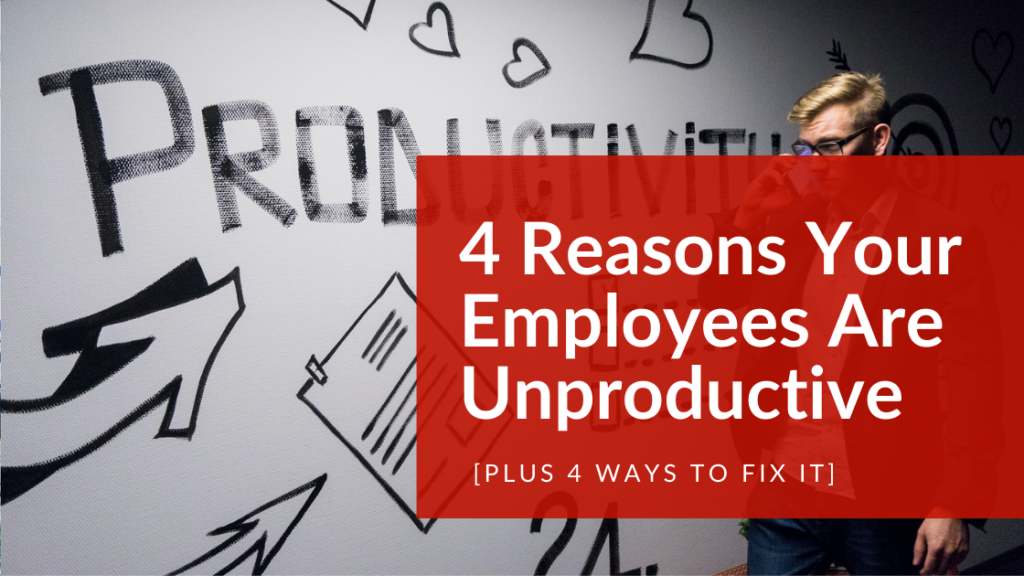4 Reasons Your Employees Are Unproductive [Plus 4 Ways to Fix It]

For organizations and leaders, ensuring employees are productive and engaged is a top priority. But in order to do so, they need to understand what causes productivity to dip as well as some strategic solutions they can implement to mitigate it.
Maintaining productivity in the workplace is something that’s always on employers’ minds. However, it can be difficult to figure out how to maintain and improve productivity without fully understanding what leads to efficiency loss in the first place.
If you’re finding that your employees aren’t being as productive as they could be, this article will give you insight into some possible causes as well as potential solutions that you can implement immediately.
4 Reasons Why Your Employees Are Unproductive

1. Lack of Recognition
Employees are human beings, not working machines. That means that they have emotional reactions to situations, including how they are treated at work by their managers and supervisors.
Of course, we all know how emotions can interfere with tasks that we are trying to complete — anxiety or grief can make it much harder to work, for example. Consequently, it is important to recognize the employees by listening to them. Just like any other emotional reaction, the feeling of not being recognized or undervalued can impact employee productivity. When employees don’t feel appreciated, they can easily become demotivated and struggle to find reasons to continue working at full capacity.
2. Poor Communication
Too many managers view communication as one-directional: managers tell employees what they need to do, and the conversation stops there. But this kind of communication structure is fairly outdated and not conducive to maximum productivity in the workplace.
Workplace communication needs to be a two-way street, where employees can voice concerns and suggestions to their managers. By listening to employees, and creating team building activities, managers can better understand what may be hindering their productivity and work to remove those obstacles. Similarly, managers should also make sure employees know the “who, what, when, where, why, and how” of your business so they can better understand where you’re coming from as a manager.
3. Employee Burnout
In our culture, “burnout” can sometimes be used almost interchangeably with workplace stress. Unfortunately, that diminishes just how detrimental burnout can be to an employee’s overall health. In fact, burnout is classified as a diagnosable mental health condition in the World Health Organization’s ICD-11, the same diagnostic tool that medical practitioners use to diagnose other conditions like depression and anxiety.
In short, employee burnout is a serious problem, and employers should create a healthy workplace for employees and shouldn’t take burnout lightly. To avoid burnout among employees, employers should consider whether they are asking their employees to do too much multitasking, to complete too much work after-hours, and whether the workplace environment is welcoming, among other considerations.
4. Lack of Flexibility
Workplace culture has drastically changed over the past few decades, and that shift has accelerated due to COVID-19. Modern workers have a strong desire for flexibility in their schedules, and when employers can’t give them that, it can decrease morale and, ultimately, productivity.
While not all businesses can easily accommodate extremely flexible scheduling, making an effort in this area by eliminating mandatory hours and letting your employees choose when they work can go a long way.
4 Ways to Increase Employee Productivity

1. Offer Flexible Work Schedules
Employers often have major blindspots when it comes to holistically evaluating what leads to top-tier performance from their employees. Far too many employers think that ruling with an iron fist will lead to increased productivity, but the opposite tends to be true.
In fact, allowing workers greater flexibility can help them maintain a better work-life balance, which leads to increased motivation and a reduced likelihood of burnout, which can hinder employee performance.
The solution is to offer flexible work schedules to your employees. If you need help managing schedules, you can use employee scheduling software to help with the process. The employees feel empowered to choose when to work and when not. At the same time, it keeps the managers informed who is available for work.
2. Recognition, Rewards, and Incentives
It’s important to remember that employees are human and respond to the same types of things that all people respond to. So, instead of attempting to micromanage and police your employees, use positive reinforcement, like recognition, rewards, and incentives.
You can start by recognizing your employees when they do good work and showing your genuine appreciation. You can also start offering additional paid time off for employees that hit certain performance benchmarks — or even increased pay. These rewards and incentives will foster motivation amongst your workers and can lead to heightened productivity.
3. Foster Teamwork and Communication
People tend to work best when they feel like there is a purpose behind their work. Communication and teamwork can help instill that motive in workers.
In short, make an effort to clearly communicate to each of your employees how their work contributes to the overall goals of the company and how they fit into the team as a whole. Not only can this help with motivation, but it can also help employees understand how best to fulfill their duties.
4. Prioritize Employee Health and Wellbeing
Employers that focus too much and too directly on their bottom line often end up shooting themselves in the foot. While changes in workplace policy can definitely elicit desirable effects, it is often those changes that affect employees’ general wellbeing which have the greatest effects.
Implementing wellness programs for employees can help reduce the incidence of burnout, improve overall productivity, foster a stronger workplace culture, and make your employees overall happier and healthier people, which brings a lot of benefits with it in itself.
Many employers think that the solution to unproductive employees is becoming harsher and stricter in the workplace. However, it’s a much better idea to become kinder, more understanding, and more compassionate to your employees if you want them to perform better at work.
If you treat your employees like people and give them the respect they deserve, they’re likely to return the favor in the form of good work.
Want to learn more about how team building and training programs can help boost productivity?
For more information about how to build more productive teams using team building and training programs, reach out to our Employee Engagement Consultants.
Author Bio:
Saurabh Wani
Saurabh Wani is a digital marketer at ZoomShift, an employee scheduling tool. He has worked as an HR Recruiter for over 2 years where he defined the recruitment life-cycle that helped employees find the right job. He loves traveling and can be seen binge-watching F.R.I.E.N.D.S when he is not working.



Comments